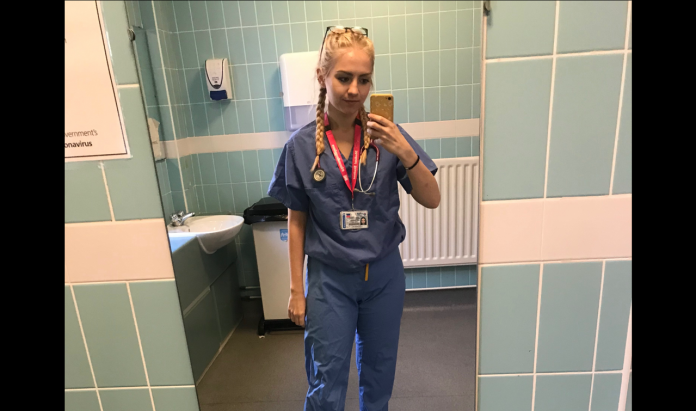I found out I had passed on June 10. It felt amazing! It was such a weight off my shoulders. I’ve been working towards this for five years, and to now be qualified as a doctor feels incredible. The best part was phoning family and hearing their reactions to the good news.
It definitely still hasn’t sunk in. I think it will take a long time to get used to introducing myself as “one of the doctors”, not “one of the medical students”.
At what age did you know you wanted to be a doctor?
I decided I wanted to go into medicine probably later than you would think.
As a child, I was determined to have a cattery. In my early teens, I wanted to be a film director. After GCSEs, I started to think more about what I could really see myself doing as a career, and it was then that I started thinking seriously about working in healthcare.
In the back of my mind, I had realised I wanted to be a doctor, but I had doubts about
applying because I was convinced I would not be successful. Eventually, I decided that it
was a risk I wanted to take!
Why did you choose to study at Newcastle? And what was your experience at university?
I spent a long time scouring medical school prospectuses and narrowed it down quite a
bit. I then applied to four medical schools, had three interviews, and got two offers.
Deciding between my two offers took a lot of deliberation as I was ultimately deciding
where I would live for five years.
It came down to the fact that I had actually enjoyed my interview for Newcastle – the
staff were immediately so reassuring and welcoming, and it was an environment I
wanted to be a part of. I had also heard good things: my big brother – now a doctor –
was at the time a medical student there and was loving it!
I haven’t regretted my choice at all. Newcastle is a fantastic city and a great place to be
a student. I’ve learned a lot and made friends for life.
How was it working and studying during the pandemic?
I felt extremely lucky to still be able to work and maintain a normal routine throughout the
pandemic. In my final year, we were in hospital every day as usual. I would have found it
really difficult to be stuck inside at home all day every day.
It was nice to feel useful and to be able to contribute to the NHS at this challenging time.
That is not to say it wasn’t much harder than any other year! The final year was always going to be a slog with an awful lot of exams, but normally you would spend time with friends, and go out, and have a life outside of medicine. Not having things to look forward to made it harder to maintain perspective.

Have you had to overcome any challenges while studying?
The biggest challenge to overcome was self-doubt. Medical school brings academic,
emotional, and physical pressures. The best way I found to deal with this was to try to
give up on being a perfectionist, and allow myself more balance – enjoying the process
is so much more important than being the best.
Another challenge was finding my feet on placement. I found the third year really difficult at times. First and second-year were lecture-based with occasional days in GP or hospital settings, whereas third year was all placement based, with rotations in different wards
and specialties.
On placement, you have to take initiative and get stuck in to the ward environment, which relies on busy staff helping you get involved. I had a few demoralising experiences in which I turned up to clinics I had been timetabled to and was told to leave because the member of staff did not want a student there. This can make it hard to remain enthusiastic!
Ultimately this did make me realise that not everyone is going to be nice to you and that this reflects much more on them than on you. By final year this was much less of an issue. Probably because I knew what I was doing more and had gained a thicker skin and a lot more confidence!
What do you enjoy about what you do?
Medicine is immensely rewarding, varied, and challenging. I really enjoy that I work with
people and work as part of a team.
Ultimately, (and I know it sounds clichéd!), I feel so privileged to get to be a part of
people’s lives; to be there with them in some of the best times, and try to help them
through some of the hardest times.
What would you say to someone who was considering becoming a doctor?
Don’t let people telling you how hard it is to get into medical school put you off applying!
Try to get work experience as it helps you decide if it’s for you, then take things one step
at a time: there’s a lot of hoops to jump through but if you just face them one by one it is
much more manageable.
What advice would you give your younger self?
No one is thinking about you as much as you are. It doesn’t matter if you try and you fail, as long as you try.
